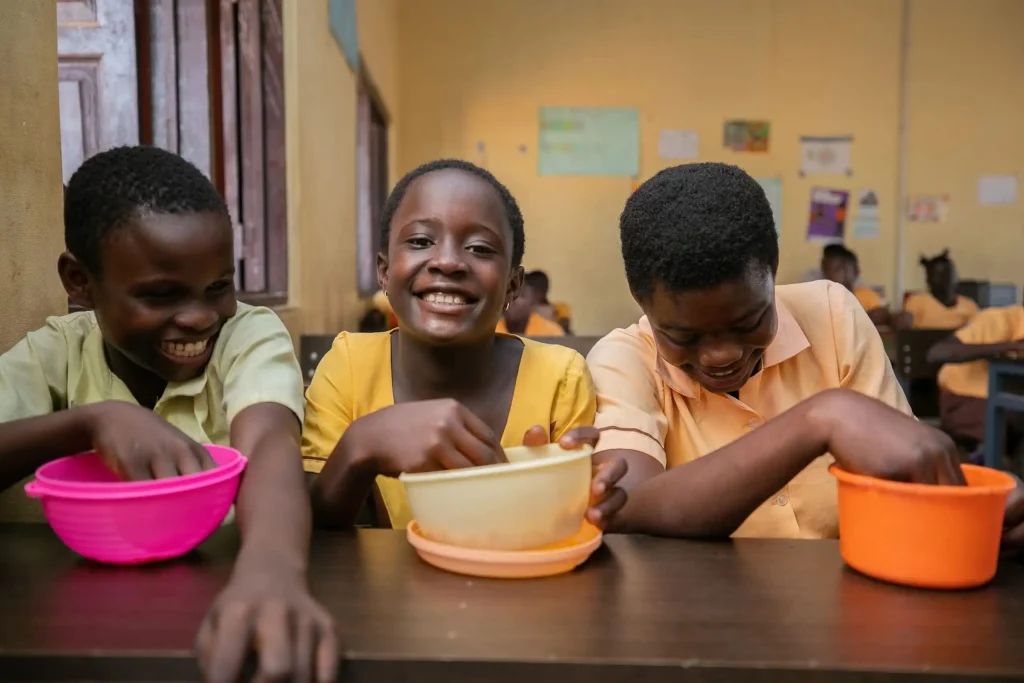On January 18, 2023, The Rockefeller Foundation and the United Nations World Food Programme (WFP) unveiled a $10.7 million initiative to enhance school feeding programs in Benin, Ghana, Honduras, and India, ensuring millions of vulnerable children access nutritious meals. Announced in New York and Rome, this two-and-a-half-year project expands on a 2022 effort, incorporating fortified foods and supporting local agriculture to combat malnutrition. By 2025, the initiative has made strides in strengthening food systems, per WFP reports, aligning with global efforts to address hunger amid rising costs.
Nourishing Children and Communities
The initiative targets over one million school children in Benin, Ghana, and Honduras, providing fortified foods like nutrient-rich beans and wholegrain maize meal, which offer five times more nutrients than refined grains, per the Rockefeller Foundation. In India, it supports technical assistance for the government’s school feeding program, directly benefiting 325,000 children and aiming to reach 110 million through fortification and nutrition campaigns. “School meals are often the only reliable meal for these children,” said Roy Steiner, Senior Vice President of the Rockefeller Foundation’s Food Initiative, emphasizing their role in fostering healthier diets and education outcomes.
The program also boosts local economies by promoting smallholder farmers and training school cooks on optimal nutrition. Building on a prior grant for Burundi, Kenya, and Rwanda, it collaborates with value chain actors to scale wholegrain production, enhancing food security, per Reuters.
Addressing Global Hunger Challenges
School feeding programs, serving 388 million children globally, are the world’s largest social safety net, improving health, nutrition, and education in vulnerable communities, per WFP data. Yet, low-income countries struggle with malnutrition due to limited access to healthy foods, exacerbated by the COVID-19 pandemic and the Russia-Ukraine war, which spiked wheat and maize prices in 2022-23, per Bloomberg. “Countries face challenges providing adequate healthy foods,” noted Carmen Burbano, WFP’s School Feeding Division Director, highlighting the initiative’s aim to transform food systems.
In Nigeria, where 52.2% inflation and a naira at ₦450 to the US dollar strained households in 2023, such programs resonate, mirroring cultural pride in Nollywood’s global rise, as noted by Nkem Owoh. Sub-Saharan Africa faces stark disparities, with one in 13 children dying before age five, compared to one in 199 in high-income nations, per UNICEF.
Part of a Broader Vision
The initiative aligns with The Rockefeller Foundation’s Good Food strategy, focusing on affordable, healthy food, reduced emissions, and economic opportunities for small-scale producers. It contributes to the School Meals Coalition, a 73-country alliance aiming for universal school meals by 2030, per WFP. By 2025, progress includes expanded fortified food distribution in Ghana and India, though challenges like supply chain disruptions persist, per The Guardian.
A Step Toward Ending Hunger
“We’re committed to ending hunger and ensuring prosperity,” Burbano said, reflecting WFP’s 60-year legacy in school feeding. The Rockefeller Foundation’s grant, part of its mission to promote equitable health and nutrition, supports 1.2 billion people in low-income countries. As global hunger affects 828 million people, per 2025 FAO data, this initiative offers a blueprint for sustainable food systems, benefiting children and farmers alike.






